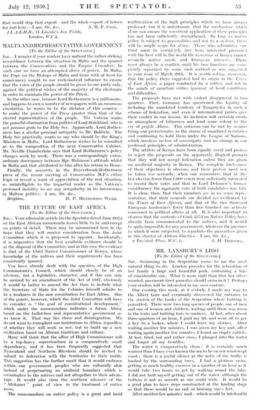MALTA AND REPRESENTATIVE GOVERNMENT
[To the Editor of the SPECTATOR.]
SI wonder if your readers have noticed the rather striking resemblance between the situation in Malta and the quarrel between the Conservatives and the Empire Crusaders. In each case we have an attempted abuse of power. In Malta, the Pope (or the Bishops of Malta and Gozo with at least his connivance) sought to use ecclesiastical influence to ensure that the votes of the people should he given to one party only, against the political wishes of the majority of the electorate in order to maintain the power of the Priest.
In the other case, because Lord Rothennere is a millionaire, and happens to own a number of newspapers with an enormous circulation, he wants to be the dictator of this country— to make the power of the Press greater than that of the elected representatives of the people. The Vatican wants the peaceful elimination from politics of Lord Strickland, who is not persona grata to the Holy See. Apparently, Lord Bother- mere has a similar personal antipathy to Mr. Baldwin. The Holy See practically wants to say who should be the King's Ministers in Malta. Lord Rotherntere wishes to be consulted as to the composition of the next Conservative Cabinet. Mr. Neville Chamberlain says that Lord Rothermere's policy changes week by week. There was a correspondingly extra- ordinary discrepancy between Mgr. Robinson's attitude whilst in Malta and that attributed to him after his return to Rome.
Finally, the accounts in the Beaverbrook-Rothermere press of the recent meeting of Conservative M.P.s either feign or reveal a want of appreciation of the real situation, as unintelligible to the impartial reader as the Vatican's professed inability to see any irregularity in its interference in Maltese polities.—I am, Sir, &c.,




































 Previous page
Previous page